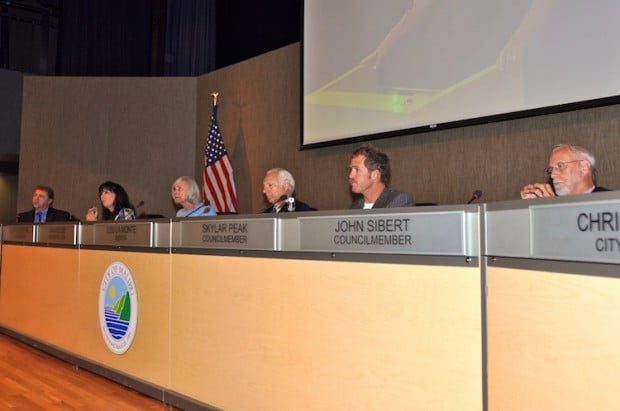
In a 4-0 vote, the Malibu City Council on Monday denied the latest appeal by the owners of the Circle K convenience store to sell beer and wine.
The council also approved a licensing agreement to create a and use it as a tool for bringing in revenue. Additionally, council members unanimously passed a resolution to create an online system to gather feedback from residents on city issues.
The council’s vote appears to end a long-running pursuit of an alcohol permit by the owners of the convenience store at the intersection of Pacific Coast Highway and Rambla Pacifico Street.
The Sarraf family, which owns the Circle K and the adjoining 76 gas station, first sought a conditional use permit for alcohol in 2007 when they were building it. But the Planning Commission denied the application after nearby residents circulated a petition opposing the permit, acquiring 300 signatures. The owners tried again last year, but met the same fate at the Planning Commission, and filed an appeal on the commission’s ruling to the City Council.
City staff, in its recommendation to deny the appeal, cited the high concentration of nearby businesses that already sell alcohol: La Costa Restaurant and Country Liquor Store, located across the street from Circle K, and Duke’s Restaurant, located just east of the convenience store.
Permit expediter Don Schmitz, representing Circle K owner Mehran Sarraf, vehemently argued that it was unfair for city officials to begin placing limits on how many alcohol permits are issued.
The City Council, however, said it might be time for the city to more carefully examine how many permits for offsite consumption are issued. Currently, there are five conditional use permits throughout the city allowing for the sale of alcohol for offsite consumption and 47 licenses for on and offsite alcohol consumption, according to senior planner Stephanie Danner.
“We’re in a position as a city where we need to start limiting these kinds of things,” said Councilman Skylar Peak, citing safety concerns with establishments along PCH. “If we continue to add more beer and wine licenses… we’re going to have more issues with drunk drivers on the highway.”
Two women who spoke in defense of Sarraf ’s attempt to obtain the permit accused the City of Malibu of discriminating against Sarraf for being Persian.
“If Mr. Sarraf was a white Malibu resident, they would approve him to have the business,” said Farzan Okhovat.
Those claims were refuted by Councilman John Sibert and Mayor Lou La Monte.
“I’m not basing my decision on ethnicity and I think that is rather insulting to all of us,” La Monte said.
Nearby residents also turned out to oppose the appeal on the grounds that the ability to purchase beer and wine at the station would pose a safety risk for everyone.
“This would harm us and harm the children in our community,” said resident Barry Glaser. “It is something that we should not allow.”
Mayor Pro Tem Joan House recused herself from the vote because she was a member of the planning commission that initially turned down a permit for beer and wine sales out of the store.
Bicyclist’s death heightens PCH safety concerns
Following the death of bicyclist Marisela Echeverria on Oct. 13, safety on Pacific Coast Highway was a hot topic among residents, bicycle advocates and council members at the meeting.
“This city still doesn’t have regulations over bike use,” said resident Hans Laetz. “We have a general plan that says there should be a bike lane, but we still don’t have a bike plan for Malibu.”
Eric Bruins, a member of the Los Angeles County Bicycle Coalition, encouraged the city council to get moving on a plan for PCH safety.
“We’re still in need of an inclusive vision for what we want to see on PCH,” Bruins said.
Councilwoman Laura Rosenthal said she had met with Bruins and La Monte to discuss the issue, and added that the results of the city’s recent PCH safety study would help better gauge what can be done.
Council approves $90,000 branding initiative
Council members voted 4-1 to pay licensing company Excel Corporation $90,000 to create a City of Malibu logo and a licensing program.
Assistant City Manager Reva Feldman called the licensing agreement a “very unique opportunity,” noting that Malibu is “one of the few cities in the world that has this kind of name recognition.”
Any revenue from licensing the City of Malibu’s name would go directly to the city’s general fund.
But Councilman Skylar Peak, the lone dissenting vote, took issue with the cost of the agreement.
“$90,000 for this seems like a ton of money that the city should be spending on skate parks and stuff like that,” Peak said.
Feldman cited companies already using Malibu’s name for products such as Malibu Barbie and Malibu Rum.
“They’re all profiting from that. The City of Malibu does not get any revenue from that,” Feldman said.
With a licensed logo, Feldman said the city could potentially make millions of dollars in revenue.
Councilwoman Rosenthal said the licensing agreement would allow the city to profit without having to ask residents to chip in.
“To be able to find a revenue stream that doesn’t affect our residents…I think is really wonderful and creative,” Rosenthal said.
